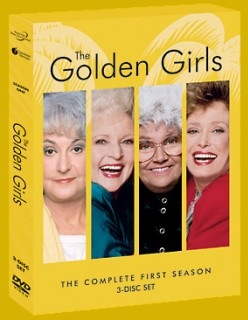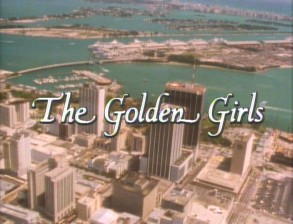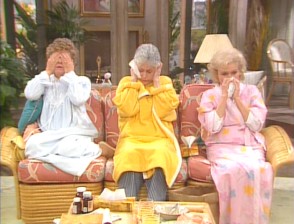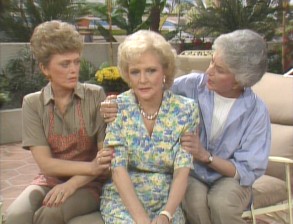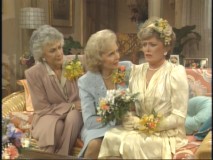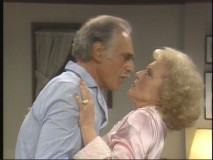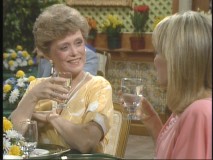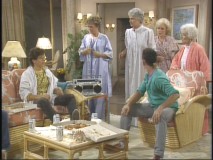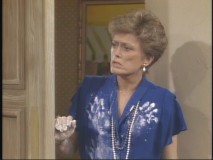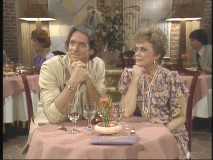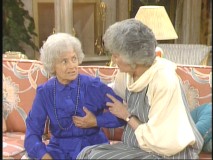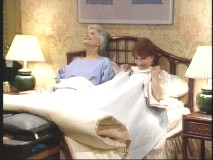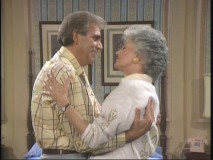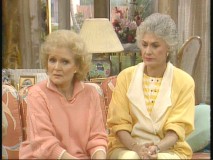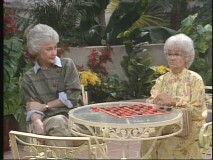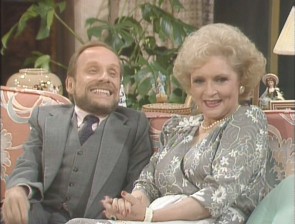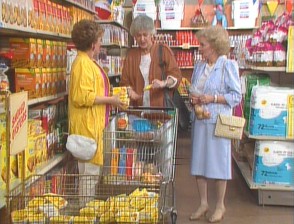The Golden Girls on DVD: Season 1 Season 2 Season 3 Season 4 Season 5 Season 6 Season 7 NEW!
"The Golden Girls" The Complete First Season DVD Review
By Aaron Wallace
Centered around four single women, three in their golden years, one in her eighties, "The Golden Girls" stands in stark contrast to the typically youth-driven sitcom. Instead of a well-rounded family or young group of friends, this show highlighted the perspective of four bold, independent, and sexual women, characters with whom aging women (and even men) could relate. Though much of the world may see them as "old," they see
themselves as anything but. Inside, they feel young, useful, and full of purpose. In the first season of the show, this message is especially potent.
Blanche Devereaux, prideful and at times overbearing, is the vivacious beauty of the home. Exceptionally southern and exceptionally promiscuous, her love for men is her most apparent characteristic. Unfortunately, the need to play on this trait for jokes leads to her character coming off as rather one-dimensional in the first season (with a few exceptions), a problem that would dissolve as the show progressed. Dorothy Zbornak plays the part of the "straight man," so to speak, her more serious demeanor coupling with her abundant sarcasm to balance out the other girls' absurdities. Because of this, though, her humor seems a bit forced at times, utilizing obvious set-ups for other characters' jokes. Dorothy is played by Beatrice Arthur (commonly referred to as "Bea"), already a sitcom veteran, having starred in "Maude" in the 1970s. Bea's facial expressions are staples of the show. Her character is a single mother and daughter at the same time. Her husband, Stan, left her for a younger woman, and she now works as a school teacher. Like Blanche, plotlines tend to underscore Dorothy as a more central character than Sophia and Rose, especially as the show progresses.
Rose Nylund is the loveable but dim-witted poster child of St. Olaf, Minnesota, a rural town full of hilariously ridiculous stories. Compassion is her defining characteristic, and it is often she who is seeking to soothe disagreements in the rest of the strong-headed household. She very much loved her husband, Charlie, who died of a heart attack, and still very much mourns her loss. Her compassion and experiences are well channeled in her career as a grief counselor. Rose is brought to life by Betty White, already a sitcom legend for her roles on "The Mary Tyler Moore Show" and even "Mama's Family", which "Golden Girls" replaced on NBC in 1985. She masterfully balances the humor and drama that are so intricately fused in Rose's personality.
Sophia Petrillo, a feisty Italian octogenarian and mother to Dorothy, brings a little wisdom to the group. Having suffered a stroke that impaired her ability to censor her thoughts, she is often blunt and coarse. More importantly, though, is the depth with which she cares for her daughters and roommates, even if she doesn't show it. She wasn't originally intended to live in Blanche's house, but when her retirement home burned down, she needed a place to stay. Estelle Getty delivers perhaps the most impressive performance of all the leading ladies. While most viewers would swear to her age, Estelle is not even the oldest member of the cast. Extensive make-up and magnificent acting allow for a believable portrayal of an old woman who is young at heart. Unfortunately, Sophia is often treated as a sideline character in the first season, rarely getting her own plotline.
"The Golden Girls" is certainly a fan favorite. From its famed theme song to its recognizable house (which, until recently, was on display at the Disney-MGM Studios in Orlando, Florida as part of a tour). The show is set in Miami (leading one to wonder why the girls are almost always dressed in long-sleeve shirts and pants) and makes strong use of its setting, in terms of both location and time. References to current events and pop culture are a staple of each and every episode. Unfortunately, they date the show quite a bit at times, especially in these earlier episodes, which are now nearly twenty years old. Readers of this site will also likely enjoy the numerous references to Disney throughout the show.
Unlike many series' debut seasons, "The Golden Girls" doesn't struggle at finding itself in its first season. The characters are instantly well-defined and the humor instantly hilarious, perhaps contributing to its initial success (the show was a hit). However, the first season does heavily rely on visiting friends and families to propel a plot, with visitors stopping by in nearly every episode. A stronger focus on the target audience, aging America, is more evident in this season than in those to follow as well. Despite these patterns, though, the first season almost entirely avoids becoming formulaic or jaded.
After years of anxious waiting by fans, the premiere season is now finally presented on DVD in its entirety with an overall sound presentation, despite a lack of substantial bonus features.
A star ( Disc 1
1. The Engagement (The Pilot) (24:45) (Originally aired September 14, 1985)
2. Guess Who's Coming to the Wedding? (24:44) (Originally aired September 21, 1985)
3. Rose the Prude (24:47) (Originally aired September 28, 1985)
4. Transplant (24:43) (Originally aired October 5, 1985)
5. The Triangle (24:45) (Originally aired October 19, 1985)
6. On Golden Girls (24:44) (Originally aired October 26, 1985)
Disc 2
9. Blanche and the Younger Man (24:46) (Originally aired November 16, 1985)
12. The Custody Battle (24:45) (Originally aired December 7, 1985)
14. That Was No Lady (24:20) (Originally aired December 21, 1995)
16. The Truth Will Out (The Will) (24:15) (Originally aired January 18, 1986)
|
Page 1: Show Discussion, Disc 1, and Disc 2 Page 2: Disc 3, Video/Audio, Bonus Features, Menus & Packaging, and Closing Thoughts |
UltimateDisney.com | DVD Review Index | Disney / Buena Vista TV Shows Page | Search UltimateDisney.com
Reviewed November 22, 2004.
The Golden Girls on DVD: Season 1 Season 2 Season 3 Season 4 Season 5 Season 6 Season 7 NEW!
